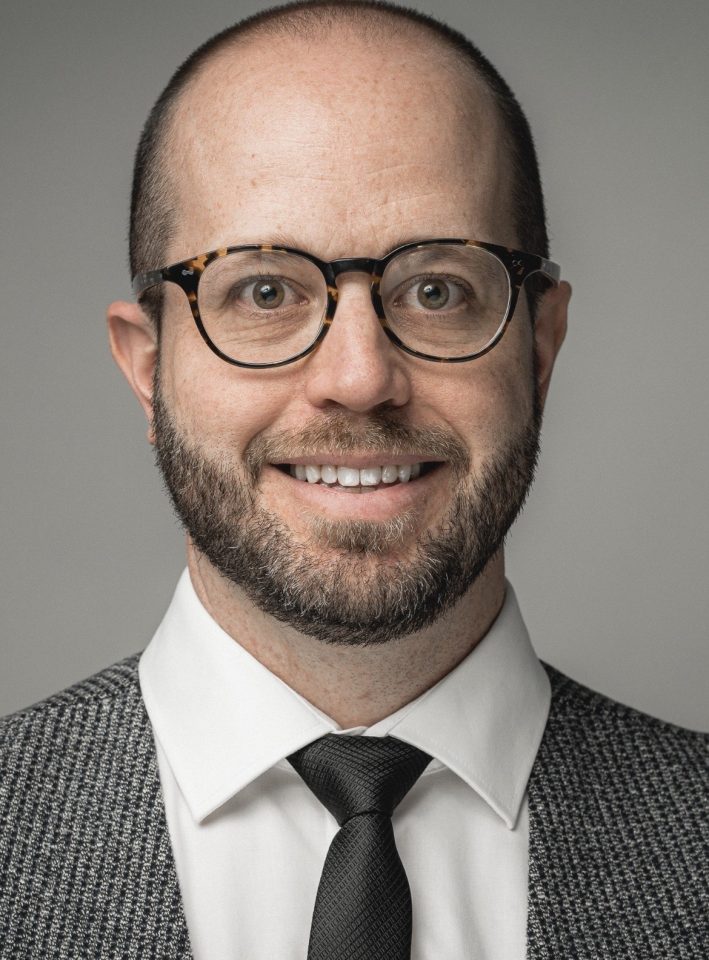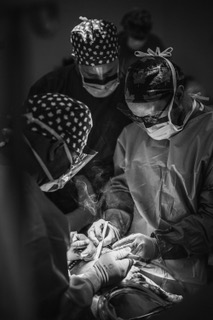
JONATHAN BOURGET-MURRAY
Clinical Instructor
Division:
Trauma
Site:
Interior – Royal Inland Hospital
Meet UBC Orthopaedics Clinical Instructor, Dr. Jonathan Bourget-Murray, an orthopaedic surgeon based in Kamloops, Canada. Learn more about his remarkable journey from an unconventional academic start to his current specialization in orthopaedics, particularly in trauma and hip and knee arthroplasty. His passion for evidence-based medicine, dedication to improving patient care, and involvement in global surgery initiatives highlight his commitment to making a positive impact on patients, communities, and society at large. Dr. Bourget-Murray encourages aspiring orthopaedic trainees to seek mentorship, gather as many surgical experiences as possible during their residency, and consistently strive for self-improvement in their surgical skills.
Can you share a little bit about your educational background and journey, and how you got to where you are today?
I am originally from Chandler, Quebec – a swift 11-hour drive east from Montreal. If you would have told my folks back in the day that I would go on to university, for 15+ years, I’m pretty sure you would have been ridiculed. I was never much of an academic – in fact, I decided to pursue sciences in CÉGEP simply to be with my friends. I veered towards health sciences and completed a BSc in Exercise Science at Concordia University. There, I met Dr. Richard Courtemanche who introduced me to the world of neuroscience. I became obsessed in recording rat brain activity in hopes to describe patterns in brain waves and nerve cell activity. I went on to complete 3-years of graduate education aimed towards investigating the changes in functional connectivity within cortico-striato-cerebellar circuits in the urethane-anesthetized rat – and I would ultimately withdraw for medicine.
I attended McGill University for medicine. At first, I assumed I would be attracted to Psychiatry or Neurology given my earlier research interest. Turns out, these specialties were not for me. A summer research project with the adult spine group introduced me to orthopaedic surgery. I remember walking into an operating room for the first time; an occiput-to-pelvis spinal arthrodesis. It became obvious to me, I wanted to become a spine surgeon… As most medical students, I then became involved in different research projects and geared my CaRMS application towards orthopaedic surgery.
How and why, I ended up in Calgary for residency has yet to make sense to me. I was pretty sure my interview station with Dr. Buckley buried any hopes to study in Calgary – but as it turns out, I may not have bombed that station after all. Throughout residency, I gravitated towards trauma and foot & ankle, but it was a surgical mission to Ecuador with True North Mission Society, led by Dr. James Powell, that finally steered me towards hip and knee arthroplasty.
Those early experiences in Ecuador doing complex hip arthroplasty helped me push my limits early on and motivated me to seek out more exposure to complex pelvis and acetabular trauma. Following residency, I completed the Trueta Orthopaedic Trauma Fellowship at the John Radcliffe Hospital in Oxford, United Kingdom and an 18-month fellowship in adult reconstruction and periprosthetic joint infections (PJI) at the University of Ottawa. Then the timing was just right, that when I was near completion of my fellowships, a job opened in Kamloops, that seemed to match my experience. Being raised in a rural community, it was an interesting opportunity for me to work outside of the city, but still get lots of complex trauma exposure balanced with an elective joint reconstruction practice.
What inspired you to work in orthopaedics, specifically in orthopaedic trauma/reconstruction?
I always enjoyed the unpredictability of trauma and strived to become comfortable operating on different parts of the body (i.e., pelvis and acetabulum, talus and calcaneus, chest wall).
As for hip & knee arthroplasty, it required me to go to Ecuador for a humanitarian surgical mission and get proper hands-on experience to appreciate this subspecialty of orthopaedics. As it turns out, these are my happiest and most grateful patients – which is always nice during a busy clinic! While arthroplasty may seem boring and redundant as a junior resident in the OR (with a fellow and senior resident ahead of you) there is more to it than you might think!
What impact would you like to see your work have on patients, communities and society at large?
I have always wanted to approach my practice following evidence-based medicine. My research interests and quality improvement initiatives on hip fracture care and management of periprosthetic joint infections (PJI) are currently my focus. I would like to improve the care of these patients by fostering a multidisciplinary approach for these patient’s care.
I also want to continue to participate in global surgery initiatives. I am currently a member of True North Mission Society, a charitable organization from Calgary whose mandate is to conduct medical missions to impoverished people who normally would not have access to medical care in Ecuador, South America.
What excites you most about your work? What are you most proud of?
I love what I do, and I’m grateful for being given the opportunity to do what I do. I am excited to have joined Kamloops Orthopaedics. We have a great group here! While I definitely get excited when a complex trauma case shows up while I’m call, that I know will challenge me intellectually and keep my surgical skills sharp, seeing patients in follow-up who are grateful for their surgery is what excites me most.
What is one piece of advice that you’d like to give to current trainees?
You have a finite amount of time in residency to learn everything you need to in order to become a (safe) independent orthopaedic surgeon. Get as many repetitions in as you can – while you can! You are mature learners; the onus is on you to seek opportunities to become competent surgeons. It is a humbling feeling to operate without supervision or “back-up”.
Ask for (constructive) feedback as often as you can! There is always room for improvement. It is helpful to find mentors early on during residency that can speak honestly to you about your training, and who you can have open discussions with about your training, your challenges and your future.
When you’re not working, where can we find you?
This year has been a whirlwind! We have settled in Kamloops and recently moved into our first home. You will find me most evenings or weekends (when I’m not on-call) at home with my wife, my 3-year-old daughter, and our dog Mikko. It turns out being a home owner is much more onerous than I expected. We have enjoyed our first few months (almost a year now!) in interior BC and are looking forward to exploring its different campgrounds and all the adventures the surrounding mountains have to offer. We also just got our season pass to Sun Peaks!



